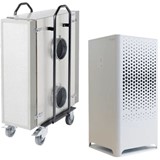Current regulation does not require companies to gain approval from federal medical authorities to advertise devices once they have been approved, meaning they could be marketed how the companies saw fit, Tom Vreugdenburg from the University of Adelaide said.
Vreugdenburg is one of the co-authors of a new study, published in the Medical Journal of Australia which has found three alternative methods being widely promoted – digital infrared thermal imaging, electrical impedance scanning, and electronic palpation imaging.
The three methods were found to have questionable evidence supporting them. The study also found the evidence concerning their ability to detect cancer and deliver an accurate diagnosis to be widely varied.
Successful prosecution cases
The findings come on the back of recent successful Federal prosecution cases by the ACCC against two Perth-based companies who were found to have made misleading claims about the safety and effectiveness of their screening methods.
Punishment for the two sites is yet to be determined by the Federal Court, however it is understood the ACCC is planning to issue official warnings to other commercial sites once penalties have been finalised.
Cancer Council Australia spokesman Terry Slavin said the recent prosecution cases by the ACCC should serve as a warning to liable companies in the commercial breast-screening market.
He said: "There are still a number of them around ... but once we get the Federal Court decision, maybe those who are still in the game will make the judgment that it is not worth the risk."




















